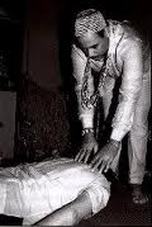
Many people who were raised in a Latino household know the custom of children asking parents to bless them before the leave the house or go to bed at night. This relates to the idea that parents are in a position to protect their children, and the parents have some kind of authority over their spiritual well-being. Naturally, it's understood that God is the one who ultimately protects us and sends blessings, but the parent can ask for God's attention on behalf of the children. In Santería, the same relationship of protection and trust exists between godparents and godchildren. The godchild asks for the blessing of his godparents as a way of expressing faith in the religion and acknowledging the godparents' role as spiritual guides. The blessing can take the simple form of words exchanged, or include physical gestures such as an embrace or a "lifting from the floor" when godchildren prostrate themselves before their godparents in the foribale, the most formal kind of salutation between initiated priests/ priestesses. To be blessed, embraced or lifted from the floor is a way for the godparents to pass on some of their aché to their godchildren. It shows at once a reverence for religious elders, and a desire on the part of elders to protect and strengthen the spiritual development of those who are younger.

Osá (9) is a sign that talks about betrayal and bad feelings between people who were once close to each other. This proverb suggests that problems can be avoided by remembering the natural order of things and respecting the way the world works. It's natural that bad feelings develop when people have expectations of each other that aren't met. But, you have to ask yourself, are you meeting the realistic expectations others have of you? Is what you expect from them realistic and within their possibilities? Sometimes the children of Osá like to pretend they don't understand or don't know how to do something as a way of getting other people to do the work for them. This proverb reminds you that there are some things that are in your realm of responsibility and you shouldn't try to avoid them. Do what corresponds to your position in life, and don't look to others to assume your duties or carry out your role.
 RSS Feed
RSS Feed
